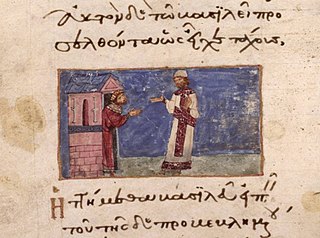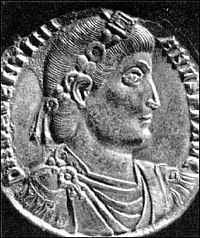
Valens was Roman emperor from 364 to 378. Following a largely unremarkable military career, he was named co-emperor by his elder brother Valentinian I, who gave him the eastern half of the Roman Empire to rule. In 378, Valens was defeated and killed at the Battle of Adrianople against the invading Goths, which astonished contemporaries and marked the beginning of barbarian encroachment into Roman territory.

Gratian was emperor of the Western Roman Empire from 367 to 383. The eldest son of Valentinian I, Gratian was raised to the rank of Augustus as a child and inherited the West after his father's death in 375. He nominally shared the government with his infant half-brother Valentinian II, who was also acclaimed emperor in Pannonia on Valentinian's death. The East was ruled by his uncle Valens, who was later succeeded by Theodosius I.

Valentinian I, sometimes called Valentinian the Great, was Roman emperor from 364 to 375. He ruled the Western half of the empire, while his brother Valens ruled the East. During his reign, he fought successfully against the Alamanni, Quadi, and Sarmatians, strengthening the border fortifications and conducting campaigns across the Rhine and Danube. His general Theodosius defeated a revolt in Africa and the Great Conspiracy, a coordinated assault on Roman Britain by Picts, Scoti, and Saxons. Valentinian founded the Valentinianic dynasty, with his sons Gratian and Valentinian II succeeding him in the western half of the empire.
Flavius Theodosius, also known as Count Theodosius or Theodosius the Elder, was a senior military officer serving Valentinian I and the western Roman empire during Late Antiquity. Under his command the Roman army defeated numerous threats, incursions, and usurpations. Theodosius was patriarch of the imperial Theodosian dynasty and father of the emperor Theodosius the Great.
Gratianus "Funarius" was an Illyrian soldier of the Roman Empire who flourished in the 4th century. He was the father of Roman emperors, Valentinian I and Valens, founders of the Valentinianic dynasty.

The Valentinianic or Valentinian dynasty was a ruling house of five generations of dynasts, including five Roman emperors during Late Antiquity, lasting nearly a hundred years from the mid fourth to the mid fifth century. They succeeded the Constantinian dynasty and reigned over the Roman Empire from 364 to 392 and from 425 to 455, with an interregnum (392–423), during which the Theodosian dynasty ruled and eventually succeeded them. The Theodosians, who intermarried into the Valentinian house, ruled concurrently in the east after 379.
Justina was a Roman empress. She was initially the wife of the rebel emperor Magnentius and was then married to Valentinian I, with whom she had four children, including the emperor Valentinian II and the empress Galla.
Afranius Syagrius was a Roman politician and administrator.
Sextus Claudius Petronius Probus was a leading Roman aristocrat of the later 4th century AD, renowned for his wealth, power and social connections. The son of the consul Petronius Probinus, he married Anicia Faltonia Proba and had two sons. He had a successful political career, becoming praefectus urbanus, Proconsul of Africa, four times praetorian prefect, and consul alongside the emperor Gratian. His grandson and great-grandson went on to become emperor.
Quintus Clodius Hermogenianus Olybrius was a Roman politician, praefectus urbi of Rome from 368 to 370 and Roman consul in 379. Olybrius has been characterized as belonging to "the breed of flexible politicians who did well both under Valentinian I [...] and under Gratian."
Vettius Agorius Praetextatus was a wealthy pagan aristocrat in the 4th-century Roman Empire, and a high priest in the cults of numerous gods. He served as the praetorian prefect at the court of Emperor Valentinian II in 384 until his death that same year.

Constantia (362–383) was the first empress consort of Gratian of the Western Roman Empire. According to Ammianus Marcellinus, Constantia was a posthumous child of Constantius II by his third wife Faustina.
Lucius Aurelius Avianius SymmachussignoPhosphorius was an aristocrat of the Roman Empire, and father of Quintus Aurelius Symmachus.

Saturninius Secundus Salutius was a Roman official and Neoplatonist author. A native of Gaul, he had a successful career as a provincial governor and officer at the imperial court, becoming a close friend and adviser of the Emperor Julian. Salutius was well versed in Greek philosophy and rhetoric, and had a reputation for competence and incorruptibility in office. He authored a Neoplatonic religious treatise titled On the Gods and the Cosmos, in support of Julian's pagan reaction against Christianity.
Flavius Taurus was a politician and a military officer of the Roman Empire. He was Praetorian Prefect of Italy and Africa, and consul in 361 AD.

Domitius Modestus was a politician of the Roman Empire. He held appointments under the emperors Constantius II, Julian, and Valens, and was consul in 372. Previously a pagan, he converted to Arianism under Valens, and was sent by Valens to mediate between the Arian and Nicene factions with Basil of Caesarea.
Claudius Antonius was a Roman politician under the reigns of Valentinian I, Gratian and Theodosius I. He was appointed consul in AD 382 alongside Afranius Syagrius.
Flavius Arintheus was a Roman army officer who started his career as a middle-ranking officer and rose to senior political and military positions. He served the emperors Constantius II, Julian, Jovian and Valens. He was appointed consul in 372 alongside Domitius Modestus.
Flavius Hypatius was a Roman Senator, who was the brother-in-law of the Roman emperor Constantius II.
Viventius was a Roman official and administrator during the reign of Valentinian I.







